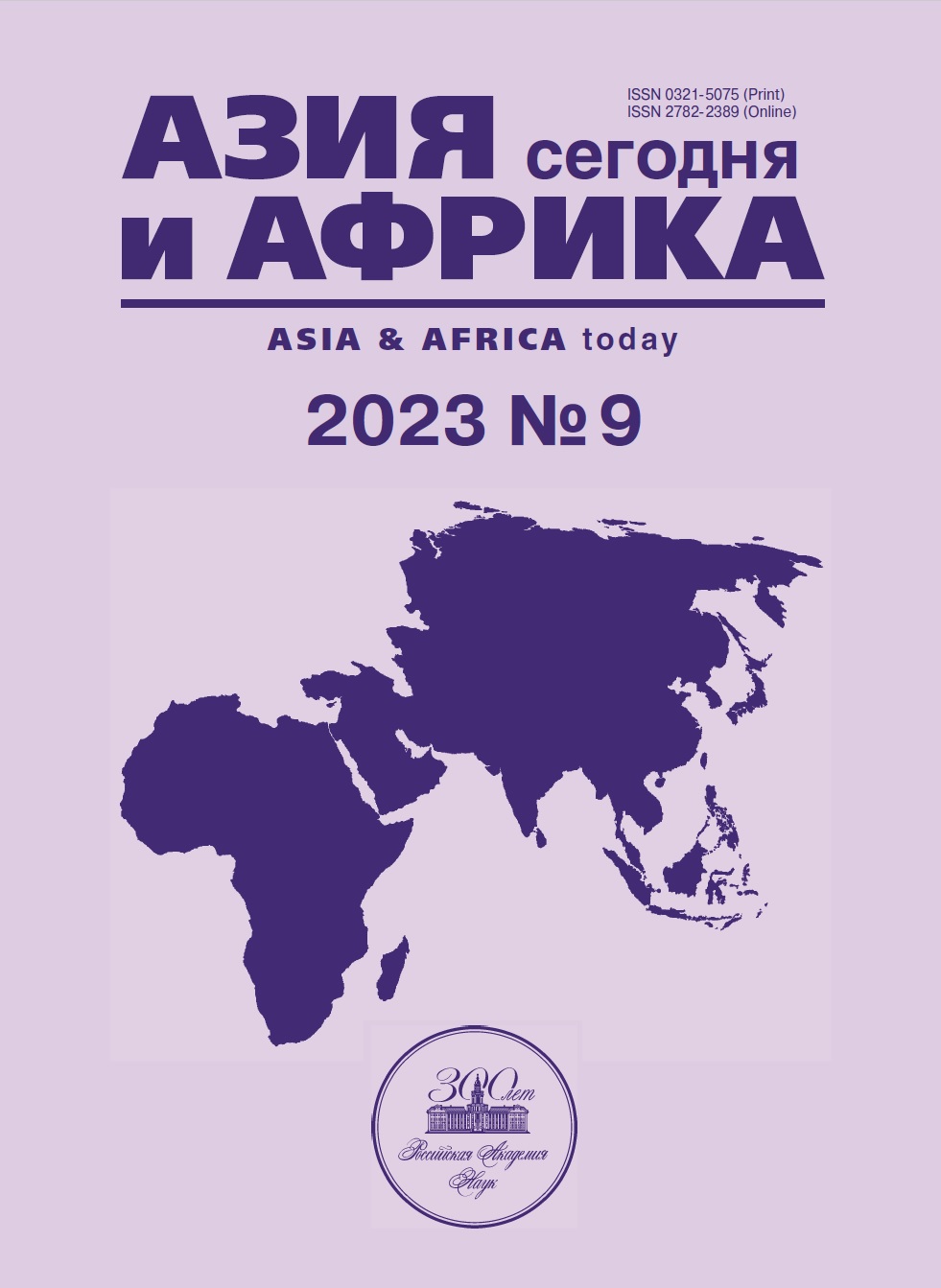The Program of Deradicalization of Islamists “Operation Safe Corridor” in Nigeria: Evaluation by Contemporary African Scholars
- Autores: Nefliasheva N.A.1
-
Afiliações:
- Institute for African Studies RAS
- Edição: Nº 9 (2023)
- Páginas: 36-44
- Seção: Politics, economics
- URL: https://j-morphology.com/0321-5075/article/view/647336
- DOI: https://doi.org/10.31857/S032150750027599-0
- ID: 647336
Citar
Texto integral
Resumo
The problem of deradicalization programs for Islamists in Nigeria has taken an important place in the studies of the modern African scholars. The article is devoted to the study of the works of contemporary African authors related to the Operation Safe Corridor program. The authors of the works selected for analysis note that the state’s forceful responses and military operations should coexist with the concept and practices of “soft power”. Scholars argue that the Operation Safe Corridor program has structural flaws. These, according to the authors, include the predominant role of the military in program management; non-transparency of program management for society; amnesty for former terrorists without justice. One of the key problems of the program is the reintegration of the former fighters into local communities. The lack of mechanisms to ensure the involvement of public and religious community leaders in the development of a deradicalization program often undermines the goals of the program. The economic dimension of the program, according to scientists, is very important. There are risks for former terrorists returning to the terrorist group due to economic problems, poverty and unemployment.
Palavras-chave
Bibliografia
- Maiangwa B., Uzodike U.O., Whetho A. and Onapajo H. 2012. “Baptism by Fire”: Boko Haram and the reign of terror in Nigeria. Africa Today. Vol. 59 (2), pp. 41–57; Onapajo H. and Uzodike U.O. 2012. Boko Haram terrorism in Nigeria: Man, the state and international system. African Security Review. Vol. 21, № 3, pp. 24–39.
- Onapajo H. 2017. Has Nigeria Defeated Boko Haram? An Appraisal of the Counter-Terrorism Approach under the Buhari Administration. Strategic Analysis. Vol. 41 (1), pp. 61–73; Nwankpa M. 2017. Dialoguing and negotiating with terrorists: Any prospect for Boko Haram? Behavioral Sciences of Terrorism and Political Aggression. Vol. 9, issue 2, pp. 106–124.
- Tella O. 2018. Boko Haram Terrorism and Counter-Terrorism: The Soft Power Context. Journal of Asian and African Studies. Vol. 53, issue 6, рр. 815–829.
- Olojo A. 2013. Nigeria’s Troubled North: Interrogating the Drivers of Public Support for Boko Haram. ICCT Research Paper. October 2013. https://www.icct.nl/download/file/ICCT_Olojo_Nigerians_Troubled_North_October_2013.pdf (accessed 29.11.2022)
- Onapajо H., Ozden K. 2020. Non-military approach against terrorism in Nigeria: deradicalization strategies and challenges in countering Boko Haram. Security Journal. Vol. 33, issue 3, pp. 476–492. doi: 10.1057/s41284-020-00238-2
- Bukarti A.B. and Bryson R. 2019. Dealing with Boko Haram Defectors in the Lake Chad Basin: Lessons from Nigeria. London: Tony Blair Institute for Global Change; Nextier SPD (nd) Assessing community resilience and peace-building initiatives in northeast Nigeria: Entrenching peace. www.nextierspd.com; Ogbogu J.C. 2016. Nigeria’s approach to terrorist rehabilitation. Counter Terrorist Trends and Analyses. Vol. 8, № 4, pp. 16–21; Ugwueze M.I. and Onuoha F.C. 2020. Hard versus soft measures to security: Explaining the failures of counter-terrorism strategy in Nigeria. Journal of Applied Security Research. Vol. 15, issue 4, pp. 547–567. https://doi.org/10.1080/19361610.2020.1811936
- Ugwueze M., Ngwu E., Onuoha F. 2022. Operation Safe Corridor Programme and Reintegration of Ex-Boko Haram Fighters in Nigeria. Journal of Asian and African Studies. Vol. 57, issue 6, pp. 1229–1248. https://doi.org/10.1177/ 00219096211047996
- Njoku L.E. Amnesty for terrorists, call for breakup, says MASSOB, Ohanaeze. The Gardian. 23.02.2020. https://guardian.ng/news/amnesty-for-terrorists-call-for-breakup-says-massob-ohanaeze/ (accessed 29.11.2022)
- Vigers B., Bikus Z. 2023. 3 Key Issues Facing Nigerians Ahead of Their Election. Gallup. 23.02.2023. https://news.gallup.com/poll/470945/key-issues-facing-nigerians-ahead-election.aspx (accessed 08.05.2023)
- Bikus Z. 2022. Nigerians’ Confidence in Government Falls to Lowest in Africa. Gallup. 21.06.2022. https://news. gallup.com/poll/393953/nigerians-confidence-government-falls-lowest-africa.aspx (accessed 09.05.2023)
- Felbab-Braun V. 2018. “In Nigeria, We Don’t Want Them Back: Amnesty, Defectors’ Programs, Leniency Measures, Informal Reconciliation, and Punitive Responses to Boko Haram”. The Limits of Punishment: Transitional Justice and Violent Extremism. UN University Centre for Policy Research and Institute for Integrated Transitions, May. https://i.unu.edu/media/cpr.unu.edu/attachment/2766/FINALThe-Limits-of-Punishment-01062018.pdf
- Mmakwe A.O. 2022. De-Radicalization and Reintegration of Nigerian Repentant Terrorists in Restorative Justice: Issues and Challenges. Nnamdi Azikiwe University Journal of Commercial and Property Law (nau.jcpl). Vol. 9, № 2, pp. 35–45.
- Ike J.T., Singh D., Murphy S., Jidong D.E., Porrit F. & Ayobi E.E. 2022. Community perspectives of former terrorist combatants, militants and reintegration programmes in Nigeria: A systematic review. Behavioral Sciences of Terrorism and Political Aggression. Vol. 14, issue 2, pp. 142–168. doi: 10.1080/19434472.2020.1834431; Ike J.T., Singh D., Murphy S., Jidong D.E., Porrit F. & Ayobi E.E. 2021. Rethinking reintegration in Nigeria: Community perceptions of former Boko Haram combatants. Third World Quarterly. Vol. 42, issue 4, pp. 661–678. https://doi.org/10.1080/01436597.2021.1872376
- Owonikoko S.B. 2022. “Take them to Government House or Aso Rock”: Community receptivity to reintegration of Operation Safe Corridor’s deradicalised Ex-Boko Haram members in Northeastern Nigeria. Cogent Social Sciences. Vol. 8, issue 1. doi: 10.1080/23311886.2021.2015884
- Денисова Т.C. Нигерия: итоги первого срока президентства Мохаммаду Бухари и всеобщие выборы 2019 г. Азия и Африка сегодня. 2019. № 8. С. 37–42. https://doi.org/10.31857/S032150750005775-4
- Afoaku O.G. 2017. Islamist terrorism and state failure in northern Nigeria. Africa Today. Vol. 63, № 4, pp. 21–42. Onuoha F.C. 2020. Dilemma of voluntary surrender to state security forces by Boko Haram recruits in Nigeria. African Journal of Terrorism and Insurgency Research. Vol. 1, № 1, pp. 199–218. http://dx.doi.org/10.31920/2732-5008/2020/S1n1a11; Onuoha J.I. and Ugwueze M.I. 2014. United States security strategy and the management of Boko Haram crisis in Nigeria. Global Journal of Arts, Humanities and Social Sciences. Vol. 2, № 3, pp. 22–43.
- Gulyás A. 2021. The Role of the Civilian Joint Task Force in the Improvement of Security in Borno State, Nigeria. Journal of Central and Eastern European African Studies. Vol. 1, № 4. https://doi.org/10.59569/jceeas.2021.1.4.28
Arquivos suplementares










